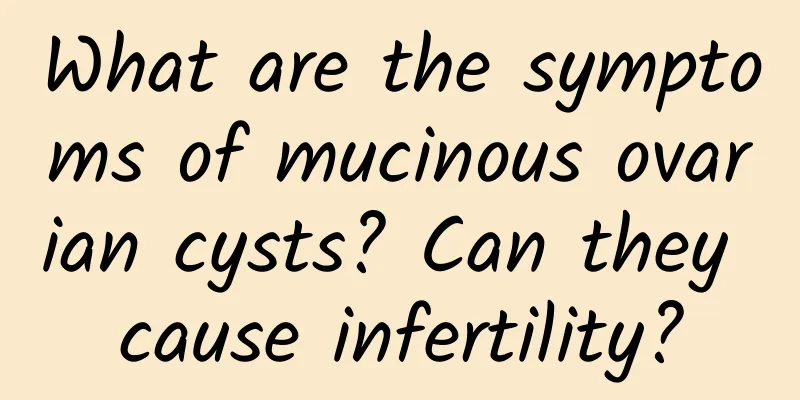What are the symptoms of mucinous ovarian cysts? Can they cause infertility?

|
Can symptoms of mucinous ovarian cysts cause infertility? Ovarian mucous cysts can be physiological and disappear naturally with the changes in the menstrual cycle. The most common pathological ovarian cysts are serous cystadenoma and mucinous cystadenoma. Symptoms of mucinous ovarian cysts include: 1. Benign mucinous cystadenoma is rare on both sides. Generally speaking, compression syndrome is easy to occur. 2. Pelvic masses and ascites are common in borderline mucinous cystadenomas, and abdominal pain or distension may also occur. 3. The symptoms of mucinous cystadenoma are similar to those of serous carcinoma, but unilateral cystadenoma is more common than serous carcinoma. It is generally manifested by abdominal swelling, abdominal distension, abdominal pain or compression symptoms. Cachexia and weight loss may occur in the late stage, and a small number of patients may also have menstrual changes. Complications: Occasionally combined with appendiceal mucinous cystadenoma and peritoneal pseudomyxoma. Benign mucinous cystadenoma should be noted for the combination of borderline or malignant mucinous carcinoma. The chance of pregnancy is 3 to 4 times higher than that of serous cystadenoma. The ovaries are where the eggs develop, mature and are released, and the follicles at different stages are in the ovarian cortex. If the ovaries are damaged, the development, maturation and release of the eggs are impaired, which can lead to infertility. Ovarian mucocysts are a type of ovarian tumor, and their infertility mechanism is related to interference with ovulation function. Ovarian thyroid tumors, ovarian granulosa and other ovarian cysts with endocrine functions - theca cell tumors, testicular blastoma, etc., due to the different tumor tissue components, will produce some corresponding hormones, which interfere with the normal secretion of ovarian hormones and ovulation, and cause symptoms such as amenorrhea, uterine bleeding, hirsutism, and infertility. |
<<: Symptoms of cervical erosion and bleeding in pregnant women
Recommend
The incidence of dysfunctional uterine bleeding
The exact incidence of dysfunctional uterine blee...
Choosing the right method can effectively treat patients with pelvic inflammatory disease
At present, there are more and more patients with...
Effective methods for detecting congenital absence of vagina
What are the effective methods for detecting cong...
Symptoms of vaginal candidiasis during menstruation
Common symptoms of candidal vaginitis include vul...
What is the reason why menstruation has not come yet?
What is the reason why menstruation has been dela...
What are the dangers of dysmenorrhea
Dysmenorrhea is a common problem for many female ...
How long does it take to cure cervical precancerous lesions?
Generally speaking, the earlier cancer is discove...
The analysis of vaginitis can start from leucorrhea
Analyzing the symptoms of vaginitis, confirming t...
What tests should be done for Bartholinitis?
Bartholinitis has a huge impact on women's bo...
Is infrared therapy good for chronic cervicitis in women? Three nursing measures after treatment of chronic cervicitis
There are many treatments for chronic cervicitis....
How much does it cost to induce abortion for ectopic pregnancy? ...
Ectopic pregnancy is an unexpected event that eve...
Are cervical erosion and polyps the same thing? Are they contagious?
Cervical erosion and polyps are not the same prob...
What to do if women in their forties have menstrual disorders
What should women in their forties do if they hav...
What are the methods for treating cervical erosion?
What should we pay attention to when treating cer...
Burdock is a starchy vegetable. Will eating too much make you fat? Nutritionist Liu Yili: Don’t make the mistake of eating burdock for health preservation
Burdock is a common side dish in Japanese cuisine...









